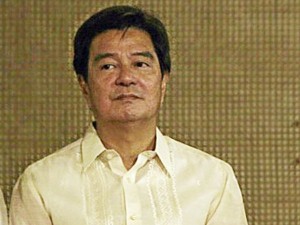
WEAKEST LINK? This is what leaders of the Management Association of the Philippines and Tourism Congress think of Tourism Secretary Alberto Lim, whom they accuse of virtually ignoring the law by ignoring the Tourism Congress, formed under the Tourism Act of 2009. INQUIRER PHOTO/EDWIN BACASMAS
The growing disagreement between leaders of the Management Association of the Philippines and the Tourism Congress on one side and Tourism Secretary Alberto Lim on the other was raised a notch higher on Thursday, with the latter being called “the weakest link” in the country’s drive to attract more tourists.
During a forum in Makati City, officials of both organizations aired their worries about the policies of the Department of Tourism (DoT), even as they vowed to “make tourism really work for the country.”
“The leadership of the DoT is the weakest link, that’s why the private sector wants to help strengthen it,” MAP president Felino “Jun” Palafox Jr. said.
Despite this, the outspoken business leader stopped short of calling for Lim’s resignation.
MAP Task Force on Tourism chairman Jose Magsaysay added that the problem in the tourism industry today stemmed partly from the government’s failure to unite major stakeholders in the private sector behind tourism programs.
“The MAP is doing something to solve the problems in the industry,” said Magsaysay, noting the continued failure of the DoT and Tourism Congress to resolve their differences.
In a text message to the Inquirer, the tourism secretary said the opinions expressed about him during the forum were from “people who have self-serving agenda.”
“I do not believe it is shared by the President,” Lim said.
For her part, Tourism Congress president Alma Rita Jimenez said the problems in the tourism sector could be easily resolved if only Lim would “respect the law” by recognizing the present composition of the Tourism Congress and working with it.
“If the violation [of not respecting the Tourism Congress] comes from the government itself, what kind of leadership is that?” Ms. Jimenez asked. “All we want from [DoT] is just to do things properly.”
Jimenez said private sector stakeholders have done everything to reach out to Lim to little avail.
“He never showed the way,” Jimenez said. “By ignoring the body he is in effect ignoring the law.”
MAP official Manuel Alcuaz Jr., on the other hand, described the tourism chief as “a smart guy” whose style of leadership “probably fits another department.”
The Tourism Congress, the private sector consultative body created under the Tourism Act of 2009, has been lamenting Lim’s refusal to work with its officials in moving the government’s tourism agenda forward.
“The government must give the Tourism Act of 2009 a chance to work by enabling the private sector to do what it does best: do business,” Magsaysay said.
He expressed surprise that such a mechanism for a potentially strong partnership between the public and private sectors had not been tapped by the DoT.
“MAP can step in and serve as the catalyst in getting tourism stakeholders, particularly the DoT and Tourism Congress, to work together harmoniously in pursuit of the country’s tourism objectives,” the official said.